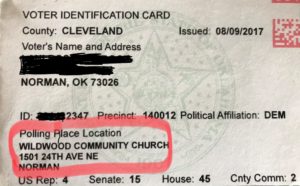Know How To Vote
Important Words to Know
District: Oklahoma is divided into districts, or areas made of different zip codes. There are two types of districts: house districts and senate districts. Everyone lives in a particular house district and a particular senate district
Polling Station: The place where you go to vote in an election. Your polling station can be found on your Oklahoma Voter ID Card.
General Election: An election that occurs between candidates from different parties that run against each other to become an elected official.
Candidate: A person running in an election.
Voter ID Card: A card that is given to a registered voter. The card lists your name, address, political party, and the polling station where you must go to vote in elections.
Ballot: A paper you receive on Election Day at your polling station that you will fill in to choose which candidates you vote for.
Before Voting
1. Get registered to vote. Only United States Citizens are allowed to vote. To register to vote, you can contact CAIR Oklahoma at (405) 415-6851 or go to https://www.ok.gov/elections/Voter_Info/Register_to_Vote/ and follow the instructions.
2. Once you have registered to vote, you will receive a Voter ID Card in the mail. The Voter ID Card will have your name, address, political party, and the polling station where you must go to vote in elections.
3. If you are immunocompromised or live with someone who is at-risk for COVID-19, please file to vote absentee. (You do not have to explain why you wish to vote absentee, you may do so simply because you prefer to vote by mail.)
3. Know your district. Everyone lives in a particular senate district and a particular house district. You can refer to the “Know Your District”(zip code doc) document at cairoklahoma.com or go to http://www.oklegislature.gov/FindMyLegislature.aspx and enter your address. The number in the top right will be your district.
4. Know the candidates. CAIR Oklahoma has developed a comprehensive guide to all candidates running for several districts. It includes a short biography, their platform and agenda, and contact information.
5. Know that the Primary Election is scheduled for June 30th, 2020 and General Election is scheduled for Tuesday, November 3rd, 2020.
On Election Day
1. Polling stations are open from 7AM to 7PM.
2. If you are unable to vote on the day of the election, you may vote early at your County Election Board office from 8AM to 6PM on Thursday and Friday before all elections. Also, you may vote on Saturday before the election from 9AM to 2PM. Make sure you know where your County Election Board office is located.
3. If you are not voting early, you can vote on Election Day at your polling station.
4. You must bring your Oklahoma Voter ID Card or an acceptable photo ID to your polling station. Acceptable photo ID include an Oklahoma Driver’s License, Oklahoma State-Issued Identification Card, United States Passport, or United States Military Identification.
Example of an Oklahoma Voter ID Card
Voter Intimidation
Voter intimidation is a very serious violation of a citizen’s right to cast a vote. If you observe voter intimidation, report it to a precinct worker or poll observer and to CAIR-OK immediately. Examples of Voter Intimidation:
– Aggressive questioning about citizenship, nationality, religion, or criminal background
– Demanding the removal of religious clothing such as hijab or kufi
– False statements about voting requirements, such as an ability to speak English
– Any activity intended to prevent or discourage someone from exercising their right to vote.
Why is Voting Important
State and Local elections are the most important elections! The laws and policies that significantly impact your everyday life and the budgeting decisions that fund them are made at the state and local level: roads and streets, schools, libraries, social services, sales taxes are all determined by decisions made by municipal and state government. Zoning boards and school boards determine the shape of your neighborhoods and affect the quality of your children’s education. Elected
judges and District Attorneys defend and interpret the laws that govern our state. Elected clerks and commissioners set priorities and manage properties funded by your tax dollars. Professionals such as doctors, lawyers, engineers, and others are governed by elected Boards that determine membership requirements and set standards for practice in the state. Even the implementation of federal policies can be determined by state and local governments. At every level, your voice is
vital to the processes that keep our communities running. Make sure you are heard!
Important Resources
Oklahoma State Election Board www.ok.gov/elections (405) 521-2391
For information on the Democratic Party, visit: www.okdemocrats.org
For information on the Republican Party, visit: www.okgop.com
For information on the Libertarian Party, visit: www.oklp.org

